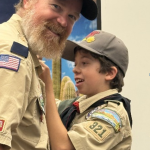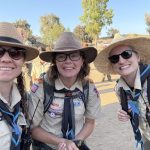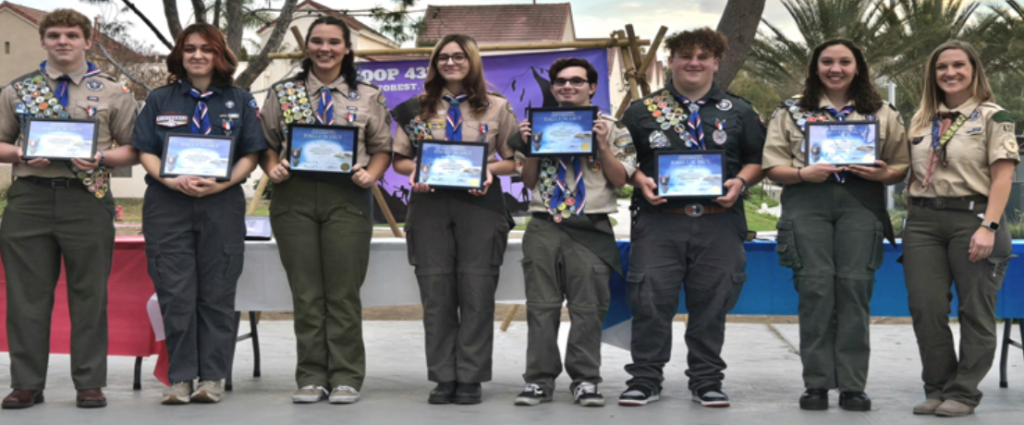
The Saddleback District is here to welcome you and your family with open arms. The Saddleback District is founded on the principle of Communities And Mentors Embracing Lifelong Scouting. AKA, Saddleback Camels. Whether your scout is 5 years old and just beginning their journey, or 20 years old and shaping their career path, we are here to support and guide you every step of the way.
Click below to read about best practices and success stories from some of our leaders.
 How did you get your introduction to Scouting? My grandparent’s neighbor, Mr. Linderman, was the Scoutmaster of Troop 604 and he invited me to join scouting. I joined Pack 765 as a Webelo with just enough time to earn my Webelos badge and Arrow of Light before I joined Troop 604. In the troop I was a Patrol Leader, Assistant Senior Patrol Leader, Senior Patrol Leader, and Troop Guild I also joined Order of the Arrow, and I received my rank as Eagle Scout.
How did you get your introduction to Scouting? My grandparent’s neighbor, Mr. Linderman, was the Scoutmaster of Troop 604 and he invited me to join scouting. I joined Pack 765 as a Webelo with just enough time to earn my Webelos badge and Arrow of Light before I joined Troop 604. In the troop I was a Patrol Leader, Assistant Senior Patrol Leader, Senior Patrol Leader, and Troop Guild I also joined Order of the Arrow, and I received my rank as Eagle Scout.
Did you quit after receiving your Eagle Scout? No, that’s when I grew to love Scouting even more. As an Order of the Arrow member, I was on and in charge of the ceremonies team and then became the Anasazi Chapter Chief in 1995 and later a Vigil Honor member. OA involvement doesn’t detract from traditional Scouting; it enables older Scouts to mentor younger ones effectively.
My understanding is your son is bridging into a Troop this year. Does that mean you’re leaving your role as Cubmaster to follow him? He has already bridged into a troop. I’ve committed to helping Pack 703 as leadership is crucial, especially with recent membership declines. A few members and I are staying to support new parents and Scouts, so the pack remains strong.
Speaking of parents, how are you getting existing parents more involved in Scouting? I just ask them. Many think they need Scouting experience, but being a parent is enough—Scout leadership is like parenting several children. I remind parents it’s about supporting the kids, not having all the Scouting skills. Don’t hesitate to encourage every parent to get involved; good parenting naturally leads to effective Scout leadership.
I’m guessing with your Scouting experience, you pretty much knew what was needed to be the great Cubmaster you are today. Not exactly. Fortunately, I had a good role model, so I shadowed him for the first five months. I didn’t receive Cubmaster training until after that, which was challenging. Now, I believe offering training before recruiting someone for a new leadership role is essential, and it’s something the District and Council should address.
You’ve committed to growing Pack 703 in lieu of tagging along with your son and his new troop. What’ the vision for Pack 703? We are a faith-based, “fun first” pack committed to maintaining an active culture year-round. While summer may mean fewer meetings, we avoid treating Scouting like a seasonal sport. Consistent activities—like game nights, water trips, and family events—help kids and parents maintain strong friendships and social bonds that might otherwise fade if our group were only seasonal like club sports.
What are your goals for Scouting moving forward? I aim to increase Pack 703 to 30 Scouts shortly, using community events like Farmers Market, events like game nights and distributing flyers to reach families in our faith community. During bible school camp, we engaged kids with Scout coloring pages, which we share with their parents as an opportunity to discuss Scouting. I also hope to start a girls’ troop at our church and eventually become the Charter Organization Representative for Mt. of Olives Church.
Any last comments or advice? I always embrace, “give back to scouting what scouting gave you”, and enjoy the experience, it’s all about kids having fun together. Even as an adult, I still do.
 What did someone say to convince you to be a Scout leader? When my oldest first visited our local Pack, I met two incredible moms near bridging. One shared her full year of Den meeting plans, and the other stepped up to co-lead—showing me the support that’s out there if you just ask.
What did someone say to convince you to be a Scout leader? When my oldest first visited our local Pack, I met two incredible moms near bridging. One shared her full year of Den meeting plans, and the other stepped up to co-lead—showing me the support that’s out there if you just ask.
What is the thing that keeps you going in Scouting? As a mom, it’s watching my kids grow. As a person, it’s the friendships and mentors I’ve found through Scouting that keep me going. A lifelong Girl Scout, I believe deeply in the values Scouting instills. For the past 10 years, I’ve volunteered with our local Pack—bringing fun and games, but also helping shape Scouts into ethical, moral kids. My children have continued in BSA, where a clear, step-by-step program offers leadership opportunities and a supportive community. It’s incredible to watch them transform into young leaders before my eyes.
How do get new parents involved in Scouting leadership? If you wait for volunteers, you might have to wait forever. I’ve learned to ask directly—learn their strengths, offer support… and then, yes, sometimes we beg.
Outside of fun games and activities, what are some things you do to keep cubs engaged? Beyond monthly Pack and Den meetings, we plan hikes, service projects, and holiday events—led by hands-on leaders who aren’t afraid to get muddy or laugh at themselves. Each summer, many of us also volunteer at South County Cub Day Camp at O’Neil Park.
What kind of community events, if any, do you normally participate in? I believe in hands-on service—Scouts should feel the impact of what they give. Our Pack leads projects like candy drives, food bank scavenger hunts, local cleanups, Spark of Love, and the 4th of July Parade.
How important are parents to your units’ success and how do you keep them engaged? Parents are key to a Pack’s success—they’re not just driving their kiddos to events but staying and giving up their time. Their support makes Scouting possible, building life skills like leadership, cooking, engineering, and friendship.
What is one thing that you would like to see in 2025 to consider the year to be a success? I’d love to see growth in the 6–7 and 11–12 age groups—both tend to be smaller in our Pack and local Troops. To keep bridging youth into BSA, we need a strong, active base of Cubs.
What’s next for you when it comes to Scouting? Vision? I’m excited to join the Orange County Contingent Leadership for next summer’s Jamboree, supporting three troops and a crew while promoting fundraising and scholarships. Locally, I look forward to graduating with my Arrow of Light Den—together since kindergarten—and ensuring our Packs stay strong and growing. Additionally, Wood Badge was a turning point in my Scouting journey, connecting me with a broader community and leading me to the Order of the Arrow, where I continue to give back through camp service and youth development. I’m eager to support the Anasazi OA chapter through inductions and fellowships, especially empowering female youth in leadership and service.
 Twenty-Five years of scouting. Your son became an Eagle years ago and you even have grandchildren from him. Yet, you’re still a Scout leader. What keeps you involved? I love the value of scouting. I’ve seen what it does for young boys and girls as they become young leaders in our community. There is just a passion when it comes to Scouting that I don’t see in many other organizations.
Twenty-Five years of scouting. Your son became an Eagle years ago and you even have grandchildren from him. Yet, you’re still a Scout leader. What keeps you involved? I love the value of scouting. I’ve seen what it does for young boys and girls as they become young leaders in our community. There is just a passion when it comes to Scouting that I don’t see in many other organizations.
How did you get involved with Scouting? My dad was a Scout and many others in my family. My dad ended his Scouting career as a First Class. I decided to continue and in 1974, I reached the rank of Eagle. I was also a member of the Ship 73 Newport Beach Explorer program where I learned survival skills on Catalina with the SEAL team. We transferred out of a helicopter into a small inflatable raft and then paddled to shore. I don’t think we can do that in Scouting anymore.
What do you think is the biggest issue for kids today when it comes to joining Scouts? I think it’s the competition for time. They have school, sports, music… There are many other programs that they and parents believe will position them for future success. What they don’t think about is that Scouting doesn’t require perfect attendance, it does not require skills with others like sports does, everyone and anyone can participate no matter what their skill level is, and they are led by well trained professionals and not just parents that were once high school or college athletes themselves. It’s just a different organization with a different purpose. In Scouting, we’re focused on growing well respected and balanced kids based upon the Scout Oath & Law, timeless values. In other organizations, it’s about winning a trophy.
So, what do you say to kids that fall into this situation? I let them know that if they are willing to invest 15 minutes per day toward Scouting, they will eventually progress toward the rank of Eagle. And the longer they stay, they’ll see older kids sharing the value of Scouting, they’ll be exposed to new skills, and if they want, they can still continue their other programs. I’m not against sports programs. My son went far in baseball, and I was a swimmer. But at some point, comparative skills will come into the picture, along with cost, and they may not have anything to fall back on. But Scouting is a comparative program. Conversely, Scouting wants everyone to succeed and at a lower price tag.
What do you think about Scout provided training? It’s the best. I’ve worked for some very large corporations that didn’t have anywhere near the training I received from Scouting. And they paid a lot of money to have those. For example, Wood badge has to be one of the best programs I’ve ever participated in.
Many Eagles leave Scouting once they’ve earned the rank. What advice do you have for those Scouts? I remind them that in almost all cases, they looked up to one of the older Scouts for direction and as a role model. Knowing that, they should realize that younger Scouts are probably looking at them the same way. If they don’t stick around, who will they look up to and be inspired to model after? I do suggest to them that now participation is on their time and encourage them to show up when they can. Balancing continuing Scouts with other demands on their time is difficult but possible. Upon earning the Eagle Scout rank I suggest that they find a quiet place and reflect on all that they have accomplished, perhaps write down their thoughts and feelings. I didn’t do that, and I wish I could have because Scouting provides so many lessons.
What would you like 2025 to look like for you and for Scouting? I would like to see us continue to get more girls involved in Scouting. I’d like to see more unit leaders participate in programs like Roundtable as there are so many great internal resources. And even visit peers outside our council. I’d like to have more parents take the time to see first-hand how their kids have grown as they climb the latter of Scouting. And last, I hope to continue to be a valuable resource to all Scouts.
 You’ve been in scouting since 2005, girl scouts, cub scouts, boy scouts, multiple leadership positions, and your kids have all aged out… What drives you to continue your commitment to Scouting? I love the program and the kids. There are so many ways that scouting can make a difference to our youth. Being part of that is fulfilling and something that I want to keep doing.
You’ve been in scouting since 2005, girl scouts, cub scouts, boy scouts, multiple leadership positions, and your kids have all aged out… What drives you to continue your commitment to Scouting? I love the program and the kids. There are so many ways that scouting can make a difference to our youth. Being part of that is fulfilling and something that I want to keep doing.
If you had to say one thing to scouting parents, what would it be? Become active with your scout’s unit. Even if the idea of being outdoors or camping doesn’t appeal to you, there are a multitude of other roles on the committee that are just as necessary. In fact, the scout leaders can’t really execute the program without the committee members who provide the “back office” support.
Can you elaborate? For the Scout Leader to lead an overnight campout, for example, there needs to be a campsite reservation in place (usually far in advance), the funding mechanism to pay for that campsite and all its expenses (usually managed via a website, etc.), communications, transportation, paperwork regarding medical forms… you get the picture. For the Scout Leaders to focus on on-site leadership and to deliver the program to the scouts, these other logistics are handled by the committee – and are just as important.
Since you’ve been a parent of two scouts transitioning from Cubs to Scouts BSA, what have you learned that you can share with others? Knowing that packs and troops operate differently, it’s important that we, as Scouters, brief new parents and scouts entering a troop about those differences at the beginning, while also realizing that it can seem like drinking from a fire hose for them. So, setting expectations, but not overwhelming them all at once with acronyms and assumptions that they understand what’s going on and how the troop operates. It should be a welcome experience and not a surprise party. With that said, though, it’s an on-going education during the scout’s time in the troop.
My son and I were members of your troop many years ago. And many of your leaders are still there. How do you keep the team and parents together? We try to make sure that above all, scouting is fun. And not just for the scouts but for the leaders and parents too. You have to find ways to keep both groups engaged. To that end, we typically plan a few events each year that are “family” activities, like beach days, service projects and holiday potlucks. When parents know each other (and the leaders), it’s a more family-friendly environment, rather than just a drop-off activity for their scouts.
It seems like Scouting is constantly changing. What do you do to stay current? Scouts BSA and our own Orange County Council have so many resources to keep current. In addition to reading the regular email newsletters, I attend the monthly roundtable meetings, and I also participate in various scout training programs, including the High Adventure Team (HAT), which is one of my favorites.
What does 2025 look like for you? Well, I still plan to be involved with my unit, and hopefully continue as a Unit Commissioner, where I’m responsible for three units. But I’m also taking on new roles at the district level that will tap into my past scouting experience and reach a broader audience. As long as I keep having fun in scouting and feel like I can make a difference, I plan to continue volunteering.
 Your troop added 12 new members, 25% growth over last year. What do you attribute this to? We are very honest with our scouts. They have a large responsibility for unit growth. We encourage them to reach out to their circle of friends and talk to them about scouting.
Your troop added 12 new members, 25% growth over last year. What do you attribute this to? We are very honest with our scouts. They have a large responsibility for unit growth. We encourage them to reach out to their circle of friends and talk to them about scouting.


